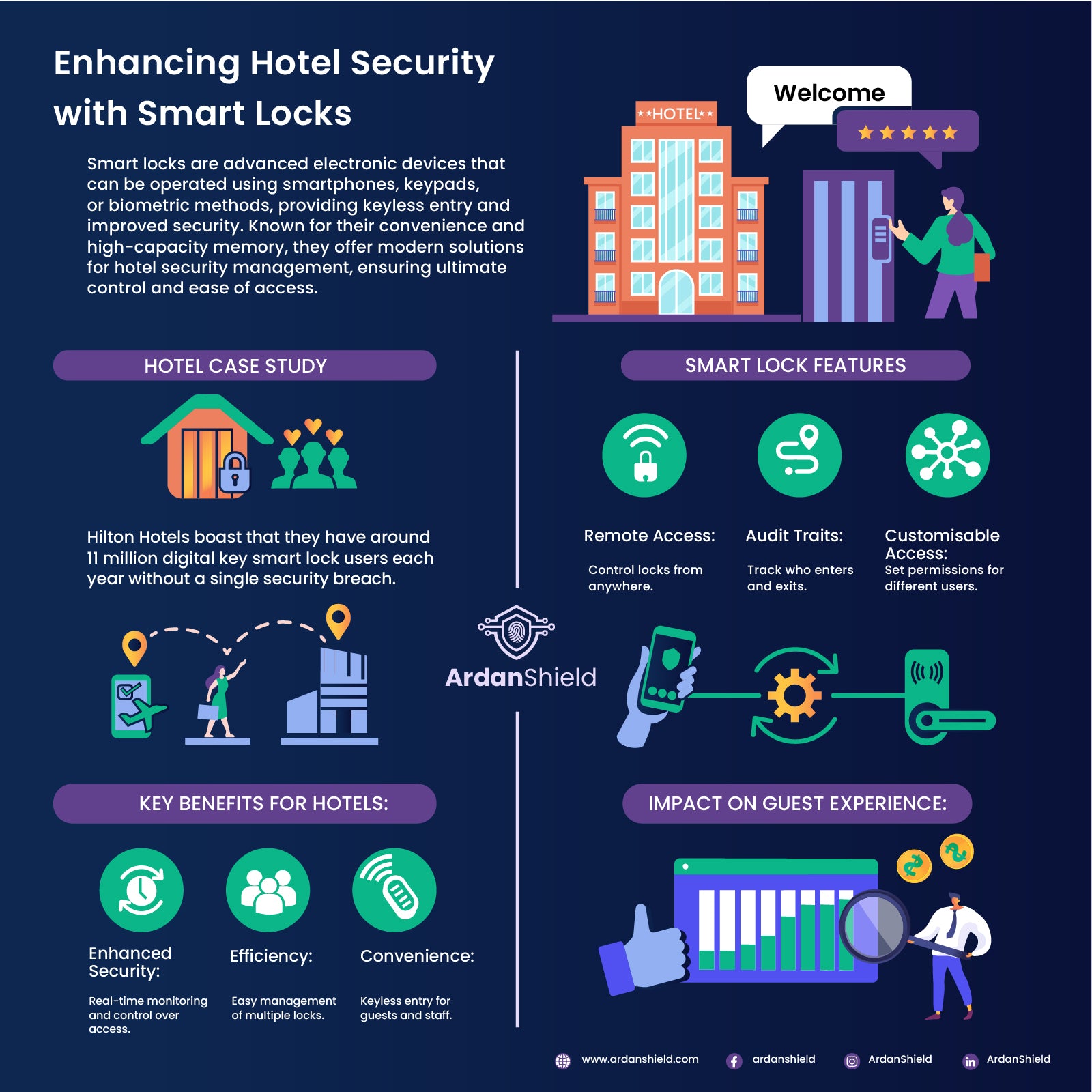Add description, images, menus and links to your mega menu
A column with no settings can be used as a spacer
Link to your collections, sales and even external links
Add up to five columns
Add description, images, menus and links to your mega menu
A column with no settings can be used as a spacer
Link to your collections, sales and even external links
Add up to five columns
How Smart Locks Enhance Hotel Security
September 24, 2024 4 min read

ArdanShield
We are a UK-based company focused on transforming security for hotels and home rentals with our innovative smart lock solutions. Our mission is to enhance the guest experience by seamlessly integrating advanced technology into properties, providing unparalleled safety, convenience, and seamless access management for modern hospitality. Experience next-level security with us.
Our Guide to How Smart Locks Enhance Hotel Security
In the competitive hospitality industry, guest safety and security are paramount. Smart locks have emerged as an essential solution for hotels, enhancing security, streamlining operations, and significantly improving the overall guest experience. By integrating advanced security technology, hotels can provide peace of mind for guests while optimising management processes.
Rise of Smart Technology in Hospitality
As hotels adapt to the demands of tech-savvy travellers, the adoption of smart technology has seen significant growth. Smart locks play a critical role in this transformation, allowing hotels to remain competitive while addressing the evolving security expectations of modern guests.
Chapter 1: The Basics of Smart Locks
What Are Smart Locks?
Smart locks are electronic locking systems that enable remote access control via smartphones and other devices. They offer advanced security features that enhance operational efficiency for hotels.
Types of Smart Locks Suitable for Hotels:
- RFID Locks: Utilize radio-frequency identification cards for secure access.
- Keypad Locks: Allow guest entry via customizable numerical codes.
- Biometric Locks: Employ fingerprint or facial recognition technology for maximum security.
Chapter 2: Security Benefits of Smart Locks in Hotels
Enhanced Guest Safety:
- Keyless Entry: Minimizes the risks associated with lost or stolen keys, enhancing guest safety.
- Temporary Access Codes: Provide guests with unique access codes valid only during their stay.
Staff Access Control:
- Manage Staff Access: Control and monitor staff entry to sensitive or restricted areas.
- Audit Trails: Maintain detailed logs of access for security audits and compliance.
- PMS Integration: Seamlessly integrate smart locks with Property Management Systems (PMS) for streamlined operations.
- Real-Time Updates: Provide instant updates to access codes and lock status, improving management agility.
Chapter 3: Operational Efficiency and Cost Savings
Streamlining Check-In and Check-Out:
- Remote Key Issuance: Empower guests to receive their room keys digitally, reducing wait times at the front desk.
- Seamless Guest Experience: Allow guests to use their smartphones for direct access to their rooms, enhancing convenience.
- Lower Costs: Cut expenses related to key management and replacement.
- Fewer Key Replacements: Eliminate headaches associated with lost keys through digital solutions.
Chapter 4: Choosing the Right Smart Lock System for Hotels
Assessing Hotel Needs:
- Size of the Hotel: Larger properties may require robust, scalable systems to manage access.
- Types of Rooms: Different locks may be necessary for various room types, such as suites versus standard rooms.
- Security Level: Evaluate high-security areas that may need advanced locking technologies.
Key Features to Consider:
- Battery Life: Opt for locks with long-lasting batteries to minimise maintenance efforts.
- Durability: Choose rugged locks to withstand frequent usage and wear.
- Connectivity: Consider options for Wi-Fi, Bluetooth, or RFID integration.
Top Brands and Models:
- ArdanShield: Explore features and benefits unique to ArdanShield smart locks.
- ASSA ABLOY: Renowned for pioneering security solutions in hospitality.
- Onity: A leader in reliable locking systems designed specifically for hotels.
Chapter 5: Implementation and Integration
Planning the Transition:
Steps to Implement:
- Assess current security systems.
- Select the most suitable smart lock system.
- Strategise a rollout plan for installation.
Installation Process:
- DIY vs. Professional Installation: Determine installation complexity to decide between self-installation or hiring professionals.
- Installation Steps: Follow a comprehensive guide to ensure proper setup of smart locks.
Integration with Existing Systems:
- PMS Integration: Ensure compatibility with established Property Management Systems.
- Booking Platforms: Sync smart locks with booking platforms for centralised operations.
- Mobile Apps: Confirm that locks are compatible with hotel mobile applications.
Chapter 6: Maintenance and Troubleshooting
Regular Maintenance:
- Battery Checks: Schedule routine battery checks and replacements.
- Software Updates: Keep lock software current to optimise functionality and security.
Common Issues and Solutions:
- Connectivity Problems: Regularly monitor Wi-Fi connections to avoid interruptions.
- Lock Malfunctions: Practice regular cleaning and lubrication of locks to prevent issues.
- Training Staff: Provide staff training sessions on effective lock management and troubleshooting.
Training Staff on Smart Lock Use:
- Initial Training: Conduct comprehensive training on the operation and maintenance of smart locks.
- Ongoing Support: Implement continuous support channels for staff updates and troubleshooting.
Chapter 7: Enhancing Overall Hotel Security
Combining Smart Locks with Other Security Measures:
- CCTV Integration: Elevate security by pairing smart locks with CCTV systems.
- Alarm Systems: Synchronise smart locks with alarm systems for added safety.
- Security Personnel: Collaborate with onsite security staff for efficient monitoring and response.
Best Practices for Hotel Security:
- Regular Audits: Schedule security audits to identify vulnerabilities in hotel security.
- Guest Education: Inform guests about the functionality and advantages of smart locks.
- Emergency Protocols: Establish clear emergency protocols and communication plans for guests and staff.
Check out ArdanShield Hotel Series Here
Secure Your World with Smart Solutions

